Crocodiles, a renegade director and an obese, out-of-control star: my time with Marlon Brando on The Island of Dr Moreau
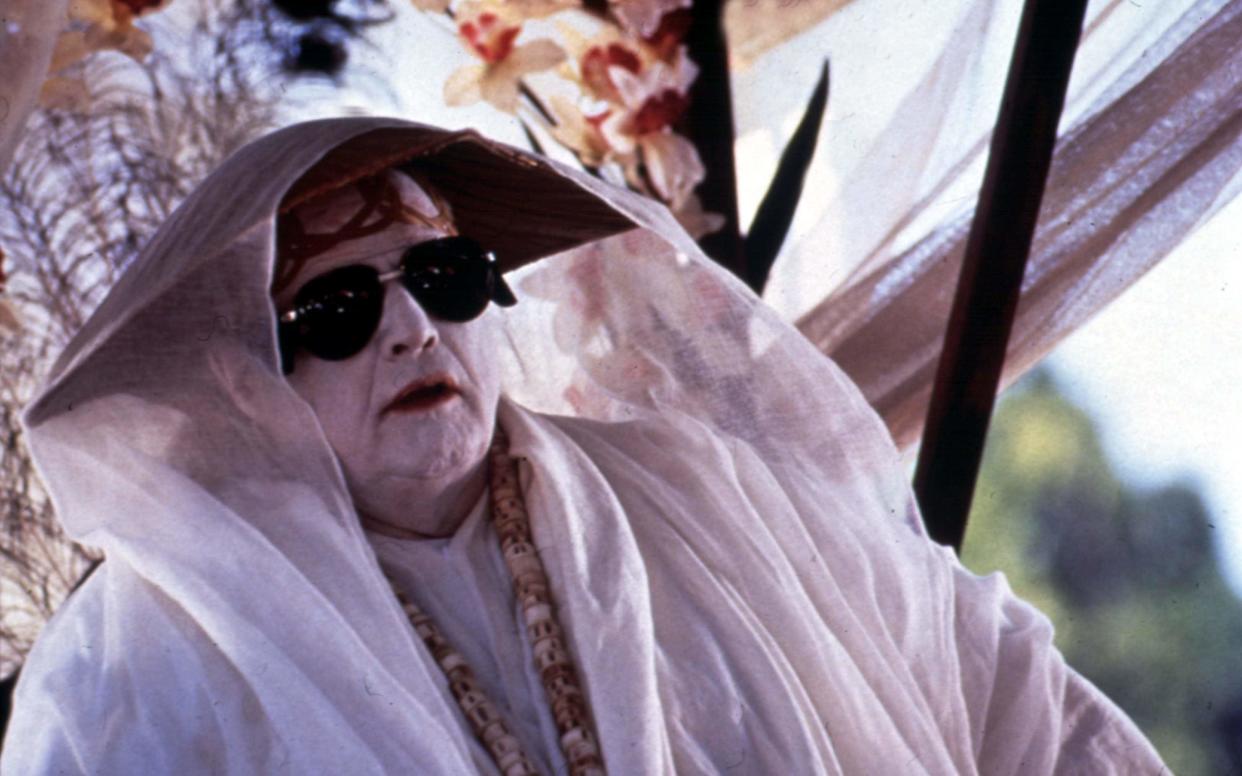
In 1995, while working at the film studio DreamWorks, I turned down the chance to rewrite Gladiator. I thought the future Oscar-winning film sounded ridiculous. I did, however, agree to work on one of the great movie disasters of all time; one so legendary that at least one documentary has been made about the debacle.
That movie, starring Marlon Brando and Val Kilmer, was The Island of Dr Moreau, an adaptation of an HG Wells novel about a renegade scientist who creates an island of monsters. The omens were bad from the start. When I arrived on the set in the northern Australia rainforests, the cast and crew had already been there for eight weeks, there was hardly any film in the can and the atmosphere was poisonous.
Not only had it been raining pretty much non-stop, but we were far too close to the outback for comfort.
A producer had been forced to move out of his rented house on the beach after a crocodile chewed its way through the screen door while his wife was feeding their three-month-old baby. On top of that, the director, Richard Stanley, had been fired after three days’ shooting.
He was replaced by John Frankenheimer, who had built his reputation in the 1960s with films like Birdman of Alcatraz and The Manchurian Candidate, but whose career had then gone into a booze-infected nosedive lasting almost 20 years.
John had brought in his own team – including me – but Stanley was still around, refusing to accept it was no longer his movie, turning up on set disguised as an extra and viewing dailies smuggled to him.
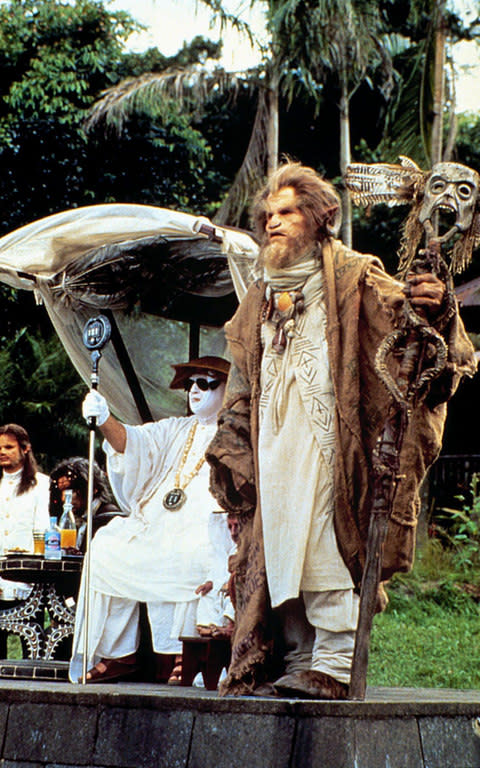
The biggest problem of all, though, was Brando. The actor had arrived on location weighing around 300lbs, most of it pizza. A tape John had sent me in London, to let me know what I was in for, consisted of 90 minutes of Brando lying in a hammock with a very small person on his chest singing Frog Went A-Courting to him. Hmm… When I say ‘small person’ I mean someone who had to be carried around the set in a child’s car seat in case he got stepped on.
Nelson de la Rosa from the Dominican Republic, at just under 28in tall – look him up on Wikipedia – was one of the smallest men ever measured. As soon as Brando set eyes on him he… well, he fell in love. A sweet, sweet guy, Nelson became, for Brando, the heart of the movie. If you know your Hollywood trivia, their on-screen relationship was the inspiration for Mini-Me in the Austin Powers movies.
Brando was here to sabotage this movie and what could be done about it?
Was there method in Brando’s madness or madness in The Method? Or was he just having a holiday at the production company’s expense, the price being the chore of standing in front of the cameras now and again? By this stage of his career, Brando – playing the god of Moreau’s island and emerging as the god of the production – was way beyond bored with show business and the making of movies.
Overweight, unprepared, mocking, dismissive, on the razor’s edge where caprice becomes malice – it was years since he’d felt any passion for films or belief in what they could do.
There was no more ridiculous and trivial way for a grown man to spend his life – Bud [Brando’s nickname] from Omaha especially, whose mum was a drunk and who hated his father. He was indeed here to sabotage this movie and what could John do about it? Wisely, as an old hand in show business, John ducked.
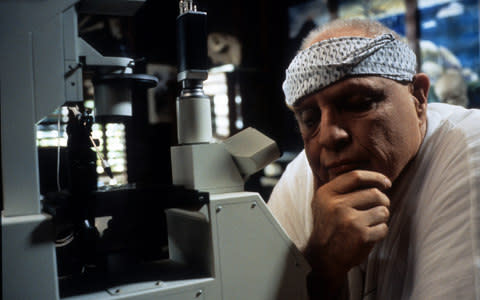
‘I’m here to direct Brando in a movie,’ he said. ‘That means my job starts when he exits the trailer. Getting him out of it is the producer’s job.’ When someone asked John why he’d taken the job on he said, ‘They offered me three million good reasons.’ That money was in the bank whether Brando played ball or not, but the concern for the rest of us was that if our star brought this production down, he’d inevitably harm our careers and reputations, too.
What Brando was doing seemed to break the contract everybody in entertainment assumes we have with our audience. We’ll give our best. Do our best work, every time. If the material is weak, we’ll try to fix it. One of the ways in which he’d expressed his disdain for the process was by refusing to learn his lines.
Even back in the Godfather days, he’d read them off large posters attached to other actors, turning them into walking teleprompters. As for my script: I had sent John a few pages while still in London which he had liked. But he told me he’d never be able to persuade Brando to say a word of them. According to Brando, ‘This isn’t a movie. It’s a pageant.’ What does that mean, John? ‘Your guess is as good as mine.’
There would also be a technical issue shooting any scene involving Brando and most of the other actors. Relations between them were toxic. One actor had deliberately spoiled another’s take by holding the tip of his cigarette to a camera operator’s ear. The same actor had interrupted a scene to answer a mobile phone. Getting them to do something as simple as sit around a table was impossible.
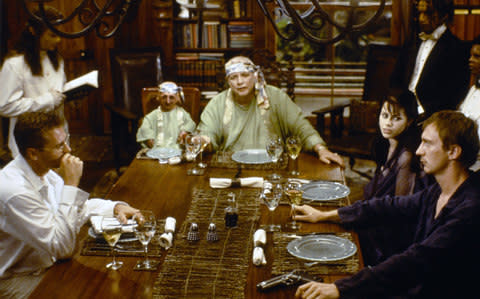
Should it be necessary to shoot such a scene they’d do it one at a time and somehow the conversation would be glued together in post-production. No doubt this would lead to, shall we say, a little jerkiness in editing and odd eyeline effects, but it would be the best that could be done.
The laws of libel caution me against a fuller description of the issues we had with the cast, but as a sampler, the armorer was so alarmed by one man’s behaviour that he refused to allow him to handle even a blank firearm. A quick rewrite gave all the gunplay to another actor, who promptly went horse riding, fell and shattered his femur. He was now in plaster and could be shot only from the waist up.
We already knew we’d be asking a lot of the audience, but to have them swallow that a lead character had been suddenly and inexplicably crippled between one scene and the next and that, if he was to chase the rampaging beast men around the island with a gun, somebody was going to have to push him in a wheelchair? Another day, another rewrite.
Even back on The Godfather, Brando had refused to learn his lines
Given all this, the production decided it might as well fall in line with Brando’s insistence that he be allowed to improvise. As soon as he did that, the others followed suit. As a writer, of course, I was naturally against that. When one character asked another what Moreau’s Nobel Prize was for, the answer came, ‘He invented Velcro.’ It was kind of funny, but I’m not sure a writer would have got it past quality control.
An actor can get away with it because once the cameras are rolling, the power is theirs. In the end, when Brando did eventually emerge from his trailer and stand in front of the cameras, he said the lines he chose to say. Some of these were relayed to him through a hearing device, it’s claimed.
One of his fellow actors says that now and again it would pick up police and emergency service transmissions and Brando would suddenly come out with ‘Armed robbery in progress at Woolworths’ in the middle of his dialogue or ‘Ambulance required at Woolagong Creek’ because somebody had been carried off by a crocodile. Anything was possible.
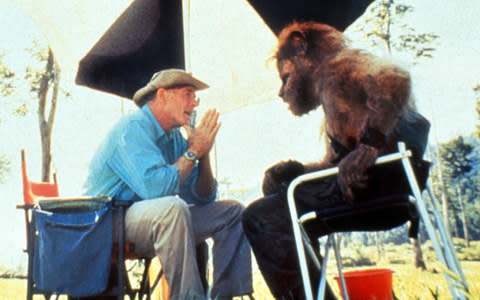
John, somehow, managed to get enough footage to cobble together a movie of sorts. Many tangled plot points were solved by the time-favoured device of having a gasoline truck blow up in the climactic scene – and it’s fair to ask if any of us watching the fireball realised our careers had probably been incinerated, too. The answer is: no.
In fact, sketchy plans were being made for a Return to the Island of Dr Moreau, should it look as if we had a franchise here.
Inside the bubble of a production, a weird optimism always seems to reign. This optimism lasted pretty much until the first previews, when the completed movie was first set in front of the public. I was lurking at the back with John and some of the executives. It had never struck me before how expressive the backs of people’s heads could be.
Even their ears had something to say and it was soon clear it wasn’t going to be good. They’d all been given cards and pencils to rate the movie on. I hadn’t paid much attention in school to negative numbers. It would have come in handy. The writing was on the wall. We didn’t just have a flop on our hands. We had a catastrophe.
© Ron Hutchinson 2017. Extract from Clinging to the Iceberg (Oberon, £14.99). To order your copy for £12.99 plus p&p call 0844 871 1514 or visit books.telegraph.co.uk

